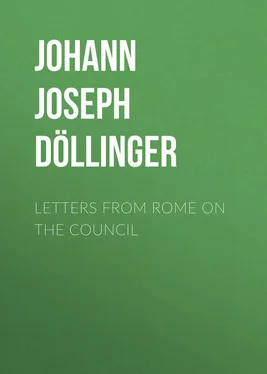Johann Döllinger - Letters From Rome on the Council
Здесь есть возможность читать онлайн «Johann Döllinger - Letters From Rome on the Council» — ознакомительный отрывок электронной книги совершенно бесплатно, а после прочтения отрывка купить полную версию. В некоторых случаях можно слушать аудио, скачать через торрент в формате fb2 и присутствует краткое содержание. Жанр: foreign_antique, foreign_prose, на английском языке. Описание произведения, (предисловие) а так же отзывы посетителей доступны на портале библиотеки ЛибКат.
- Название:Letters From Rome on the Council
- Автор:
- Жанр:
- Год:неизвестен
- ISBN:нет данных
- Рейтинг книги:3 / 5. Голосов: 1
-
Избранное:Добавить в избранное
- Отзывы:
-
Ваша оценка:
- 60
- 1
- 2
- 3
- 4
- 5
Letters From Rome on the Council: краткое содержание, описание и аннотация
Предлагаем к чтению аннотацию, описание, краткое содержание или предисловие (зависит от того, что написал сам автор книги «Letters From Rome on the Council»). Если вы не нашли необходимую информацию о книге — напишите в комментариях, мы постараемся отыскать её.
Letters From Rome on the Council — читать онлайн ознакомительный отрывок
Ниже представлен текст книги, разбитый по страницам. Система сохранения места последней прочитанной страницы, позволяет с удобством читать онлайн бесплатно книгу «Letters From Rome on the Council», без необходимости каждый раз заново искать на чём Вы остановились. Поставьте закладку, и сможете в любой момент перейти на страницу, на которой закончили чтение.
Интервал:
Закладка:
The Jesuits work assiduously in France, as well as Germany, to form a propaganda for the projected dogmas, and to familiarize men's minds with the idea that absolute certainty and inerrancy are only to be found with one man, viz., the Pope. Bouix in Paris, and Christophe at Lyons, have, with the Monde , and Univers, already most urgently inculcated on the Bishops what “good Catholics” expect of them in regard to the acclamation. But, with the exception of the Bishop of Nîmes, none of them have openly adhered to the Jesuit programme of the Council; on the contrary, the attitude of the French episcopate is perhaps at this hour the only black speck on the horizon of the Curia . And in fact with them rests the decision in the present ecclesiastical crisis. To the French episcopate it belongs to show that they still preserve the great traditions of internal freedom in the Church, newly brought to light since the mediæval reforming Councils by French theologians, and thenceforth always conspicuously represented among them, and that they are filled with the spirit of Bossuet, who did not confound loyalty to the Church with blind devotion to unfounded claims of the Pope, but understood it to mean, above all things, loyalty to the ancient spirit and original institution of the Church.
But there are good grounds for hoping that at least a majority of the French Bishops will constitute a free-spoken opposition at the Council; the two French theologians Freppel and Trullet, as well as Cardinal Bonnechose, are said to have exercised a most powerful influence in this direction. 7 7 The Cardinal's subsequent attitude has not justified this hope. Freppel too, as Bishop-designate of Anjou, has now declared himself for the infallibilists.
The latter openly complains that words of moderation are not listened to in Rome, and that, up to this time, giving any definite declarations of a reassuring nature has been avoided. He is understood to have said plainly that the great majority of the French episcopate wished to keep peace with the State, and would lend no hand to the sanctioning of extreme tendencies. It is even rumoured that a collective remonstrance of the French Bishops on the notions prevalent at Rome is already contemplated, but has not yet been able to be carried out on account of some hesitation about the mode of action. Much may be hoped from Dupanloup's attitude at the Council; in him freedom of discussion and voting is sure to find a representative equally bold and eloquent.
But even the opposition of the French Bishops will produce no results, if the decisions of the Council are to depend on majorities, for there can be no doubt that Rome may safely count on the great majority upholding her designs. We should have a repetition of what occurred in the Doctrinal Commission, when the question of Infallibility came before it, and a Monsignore and titular Bishop, residing in Rome, produced a memorial intended to prove that this high prerogative of the Pope had been the abiding faith of the Church all along, and arguing from this belief for the opportuneness of promulgating the new dogma, on the ground especially, among others, that at no period had the Bishops been so devoted to the Holy See as now. It is natural to expect of men so submissive, and so ready to follow every hint of the Papal will, that they should joyfully seize the occasion for offering this grand homage also to the Pope. This was so conclusive to the Committee that they all decided at once, without any discussion, for the promulgation of the new dogma. Only one of the two German theologians, Alzog of Freiburg, opposed it; Schwetz of Vienna, on the other hand, fully agreed. For Rome, therefore, the question is settled, and whoever is otherwise minded at once forfeits his character for Catholic orthodoxy.
Nor is there any more doubt about making the Syllabus dogmatic, for Roman prelates, who wish to have the character of being very enlightened, openly affirm that the propositions contained in it might already be regarded as dogmas. And it is stated on the best authority, even by high dignitaries themselves, that the whole of the seventeen questions laid before the assembled episcopate by Cardinal Caterini at the time of the Centenary, are to come before the Council for discussion, on the basis of the opinions then transmitted by the Bishops to Rome. And as a considerable number of these questions concern the relations of Church and State — e. g. , civil marriage, the relations of Bishops to the civil power, etc., – it is clear enough what credit is to be given to the assurances that the Council will not deal with any matter that could involve the Church in conflict with the State. It was found almost necessary, after public opinion had been alarmed by the Civiltà , to change the method of procedure. It was either expressly denied that the Council would deal with such matters as the Civiltà had indicated, or it was said that even in Rome what subjects would come on for discussion and decision was unknown, since the intentions of the Bishops, at present scattered over all parts of the world, were not known, and on the general ground that the decisions of a Council acting under Divine guidance cannot be conjectured beforehand. As if the recent Provincial Synods, and the answers of the Bishops to the questions laid before them by Caterini, had not supplied Rome with a perfectly clear understanding of their views! As if it was not notorious that the work the Council was desired to accomplish had been already cut out for it in detail in the preparatory Congregations!
Now, at length, if we may trust a communication dated from Rome in the Donau Zeitung , the authorities seem inclined to abandon this system of playing at hide-and-seek with the public, and find it necessary, in some measure at least, to lift the mask from their designs for the Council. Pius ix. himself is said no longer to make any secret of his intention to bring forward the question of Infallibility; but he declares that the Council will be left entirely free in discussing and deciding on it, and that it will only be raised to a dogma if a large majority pronounce for it. And with this agrees a recent statement of Antonelli, made in the teeth of his earlier declarations, that the Holy Father will meet the Council with positive proposals of his own, and that no doubt can be allowed as to the acceptance of his authority. This last clause shows what is meant in Rome by the so-called freedom to be enjoyed by the Council. If then that freedom is all of a sudden pointedly dwelt on, this is only one of the devices of the Curia for hoodwinking public opinion, just as eminent theologians of liberal tendencies were summoned to the previous Commissions, which were none the less occupied with duties of a precisely opposite kind.
It may be conceived that loyal but far-sighted Catholics, like Montalembert, are profoundly afflicted at the course things are taking in questions of decisive interest for the authority and the whole future of the Church, The religious indifference of the age will prevent any open schism in the Catholic Church, but the internal apostasy will be all the more extensive. All modern culture will separate itself in spirit from the Church, which has nothing but anathemas for the development of the human mind. And when an Œcumenical Council, which is the highest teaching authority in the Church, degenerates into the instrument of an extreme party, and sanctions doctrines in glaring contradiction to the teaching and history of the Church, the very foundation on which the confidence of faith has hitherto reposed is undermined and destroyed. And thus the ever growing rejection of Christianity will be powerfully strengthened, so that even believing Protestants watch with sorrow an Œcumenical Council preparing to compromise its authority. Very different, of course, is the view of men like Manning and Ward, who fancy the definition of Papal Infallibility will be a short and easy way for restoring their countrymen to the bosom of the Catholic Church. Pius ix. himself is indeed convinced that he is only building up the Church and crowning her work in placing the dogma of Infallibility on it as a cupola.
Читать дальшеИнтервал:
Закладка:
Похожие книги на «Letters From Rome on the Council»
Представляем Вашему вниманию похожие книги на «Letters From Rome on the Council» списком для выбора. Мы отобрали схожую по названию и смыслу литературу в надежде предоставить читателям больше вариантов отыскать новые, интересные, ещё непрочитанные произведения.
Обсуждение, отзывы о книге «Letters From Rome on the Council» и просто собственные мнения читателей. Оставьте ваши комментарии, напишите, что Вы думаете о произведении, его смысле или главных героях. Укажите что конкретно понравилось, а что нет, и почему Вы так считаете.












